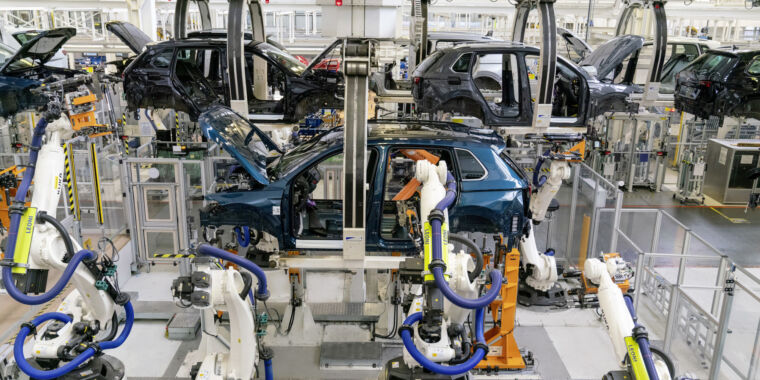Job losses likely at VW as the people’s car brand becomes uncompetitive - 2 minutes read

Enlarge / The VW plant in Wolfsburg, Germany.Volkswagen
The Volkswagen passenger car brand looks set to lay off workers, according to a report in Reuters. The news organization saw a post on VW's intranet quoting CEO Thomas Schaffer, who blamed low productivity and high costs for the impending cuts.
"With many of our pre-existing structures, processes and high costs, we are no longer competitive as the Volkswagen brand," Schaffer said at a staff meeting.
VW accounts for the highest volume among the different brands owned by VW Group but is much less profitable than either Audi or Porsche. In June, VW Group announced a $10.9 billion (10 billion euro) cost-cutting plan for the namesake brand.
Part of the problem is VW's transition from internal combustion engines to electric powertrains. EVs remain significantly more expensive than an equivalent car with a four-cylinder engine, an effect that's more pronounced in the market segments VW serves.
Lackluster products haven't helped—an ambitious plan by VW Group to master its software destiny has become a chaotic mess, delaying new vehicles in the process. Feedback about the company's new capacitive multifunction steering wheel was so overwhelmingly negative that last year, Schaffer promised to ditch the design. Meanwhile, much of the range—both electric and gas-powered—is saddled with temperature and volume controls that are touch-sensitive but not backlit, making them all but impossible to use at night.
Before VW cuts any jobs, its powerful works council has to get on board, and the two organizations have been negotiating the cost-cutting plan for some time now. Originally VW had said that it wouldn't have to fire anyone until 2029, relying instead on looming retirements (which wouldn't be replaced) to do the job until then.
VW's board member in charge of human resources told staff that it will look at partial or early retirement agreements but that the majority of the $10.9 billion in cuts would come from savings other than job losses.
Source: Ars Technica
Powered by NewsAPI.org